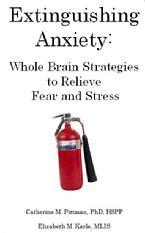
The unemployment rate today has skyrocketed to approximately 10% and is forecasted to stay above 9.5 percent for the rest of 2011. For the first time in American history, more women are working than men because close to 80 percent of the people laid off in the recent recession were men.
According to a recent study published in the “International Journal of Epidemiology,” unemployment is a major risk factor for depression, even in people without previous vulnerability. Because my husband is an architect–the housing market is dead, remember–whose work has slowed down substantially, I have an invested interest in this topic and wanted to know what I could do to help him stay physically and emotionally healthy, since, theoretically, one of us should be. Here, then, are 12 steps to bust your depression when you’re unemployed.
1. Take a breather
Whether you like it or not, you’ve just been given a breather. And chances are that you desperately needed it. One exercise to make you feel better immediately is to think about everything you hated about your job. In fact, make a list! Doesn’t that feel good? You will rejoin the rat race soon enough, so allow yourself some rest right now … a chance to actually eat a meal at home and not watch the minute hand of your watch so much. Try to appreciate the moment in present time, without constantly rushing. This hiatus from the pressure of corporate America will teach you more lessons and make you more resilient than you know.
2. Identify symptoms
According to the National Institute of Mental Health, depression affects 6 million men each year. But most men’s depression goes undiagnosed. They are much less likely to seek help because of the macho thing (they feel like they are supposed to tough it out) and because their symptoms are different than those we typically associate with depression (women’s). So it’s helpful to look out for these clues of male depression: irritability and anger, blaming others, alcohol and drug abuse, feeling ashamed, insomnia or sleeping too little, strong fear of failure, using TV, sports, and sex to self-medicate.
3. Get to work!
Before you get too cozy in your robe and slippers and watch too many episodes of “Oprah,” there’s this piece of advice: Get to work! Just because you don’t have a nice sum of money being deposited into your bank account every other week does not mean you don’t have a job. You have several, actually, and the sooner you start, the easier they will be: 1. Polish the resume. Like, for example, take out the part where you said you were class president of your freshman class in high school. 2. Network. That’s easy today with Facebook, Twitter, and LinkedIn. You’ve got tons of contacts right there at your finger tips. 3. Evaluate your career. Maybe it’s the wrong time to ask the question “Is this really what I want to be doing?” But it could also be the right time, if there ever was a right time. If you really hated your job, entertain the possibility of doing something totally different! And if it doesn’t work out, please don’t blame me.
4. Shift your self-esteem
Most of us get our self-esteem from our jobs, because we subscribe to a Calvinistic work ethic, which dictates that hard work is central to a person’s calling. We Americans are a tad obsessed with work. Men’s self-definition, especially, is wrapped up in their job, so any demotion or pink slip is a major blow to their ego and self-esteem. David Burns describes three levels of self-esteem in his book, “10 Days to Self-Esteem”: conditional, unconditional, and “non-existent self-esteem.” The last is reserved for evolved souls like Mother Teresa and Gandhi. But if we can work toward a place where our self-esteem isn’t as dependent on people, places, and things (and especially our work), we experience a kind of unmatched freedom.
5. Develop some hobbies (and get in shape)
This is a perfect time to find out what you like to do, aside from working and sleeping. Leisure isn’t a luxury for the rich and lazy. Active leisure–where you do more than control the remote–has many health benefits. There was a recent study by Salvatore Madde that showed how active leisure (for four to six hours a week) protected people from experiencing stress and developing depression, anxiety, high blood pressure, and overeating problems. If you do nothing else with your time away from the cubicle, at least begin a health plan and start working out. You will benefit enormously from the antidepressant effects of exercise alone.
6. Work on a budget
You are going to be much less stressed out if you look the monster in the face, than if you run from it. The monster, of course, being your budget. Cut out all expenses that aren’t absolutely necessary: Starbucks coffee, a landline phone number that you don’t use, a cleaning lady or gardening services, cable. Come up with some meals that are healthy but save money on expensive produce. Involve the whole family in these decisions. The more control you have over your financial situation, the less prone to depression you’ll be.
7. Connect with others
It’s easy to isolate when you lose your job. But it’s about the worst thing you can do for your mood. In her PsychCentral blog post, “Keeping My Sanity After Two Layoffs,” Stacey Goldstein describes what she did wrong after the first layoff and what she did right the second time. The first time she made herself leave the house every day, to go to the gym or to see a friend, but she still spent way too much time by herself. The second time she got a part-time job and volunteered on several committees of her community. Both required her to check in with other folks, and brought opportunities to network.
8. Stick to a schedule
Humans thrive when they keep to a routine. Our circadian rhythm, the 24-hour clock system wired into our brain that governs fluctuations in body temperature and the secretion of several hormones, and even our metabolism, require a kind of regular pattern. So stick to one even when you don’t have to. Imagine that you are working from home (because you are). Then structure your day as such. For example, work out in the morning, make some calls after you get back, eat an inexpensive lunch, follow up on some leads during the afternoon, and watch Dr. Phil right before dinner. Or not.
9. Watch your thoughts
It’s easy to catastrophize when something goes wrong in our life. One negative thought builds on another, and before we know it, we’re breathing into a paper bag in the middle of a bona fide panic attack. However, sometimes we can pluck the seeds of negativity right as they are planted, so that our recovery efforts don’t have to involve a paper bag. Just being aware of our thought process eliminates many of the trouble-makers. In the video “5 Forms of Distorted Thinking,” I identify a few of the toxic thought patterns to watch out for. You may also check out David Burns’s “Feeling Good” for more and for some techniques on how to untwist them.
10. Become useful
Everyone needs to feel useful. That’s why so much of our self-esteem hinges on our job performance. But there are a myriad of ways to feel useful even if you’re unemployed. My husband Eric, for example, has taken on more of the responsibilities for the kids–signing off on their homework, managing science projects, setting up playdates, and driving to all the sports practices and games. He also takes the dogs to the vet and gives them their ear drops every morning. Although he has less projects at work, he has more at home, where he is very much needed. Brainstorming for ways you can be useful outside of a job is definitely a mood booster.
11. Prepare for reentry
Not to be an alarmist or anything, but you might want to also prepare yourself for a rocky re-entry. Recent research says that some folks who have been unemployed for long periods of time experience anxiety and depression upon going back to work because the creditors are after them (hence there is more stress), and they are worried that they if they don’t perform perfectly, they will be fired again. However, merely being aware of this, just like the toxic thoughts, can eliminate much of the anxiety. I just wanted you to know, should you experience the same kind of thing, you are certainly not alone in feeling insecure.
12. Maintain some hope
I must end with hope because hope is the ultimate stress reducer. Hope, doctors say, is about the best thing you can do for your body. It’s better than a placebo. So remember, even though you might feel lost and disillusioned, with no path or direction visible to your eyes, it’s definitely true that “when one door shuts, another one opens.” I have seen it happen so often in the lives of family members and friends, and I have experienced it in my own life. So keep on hoping.

